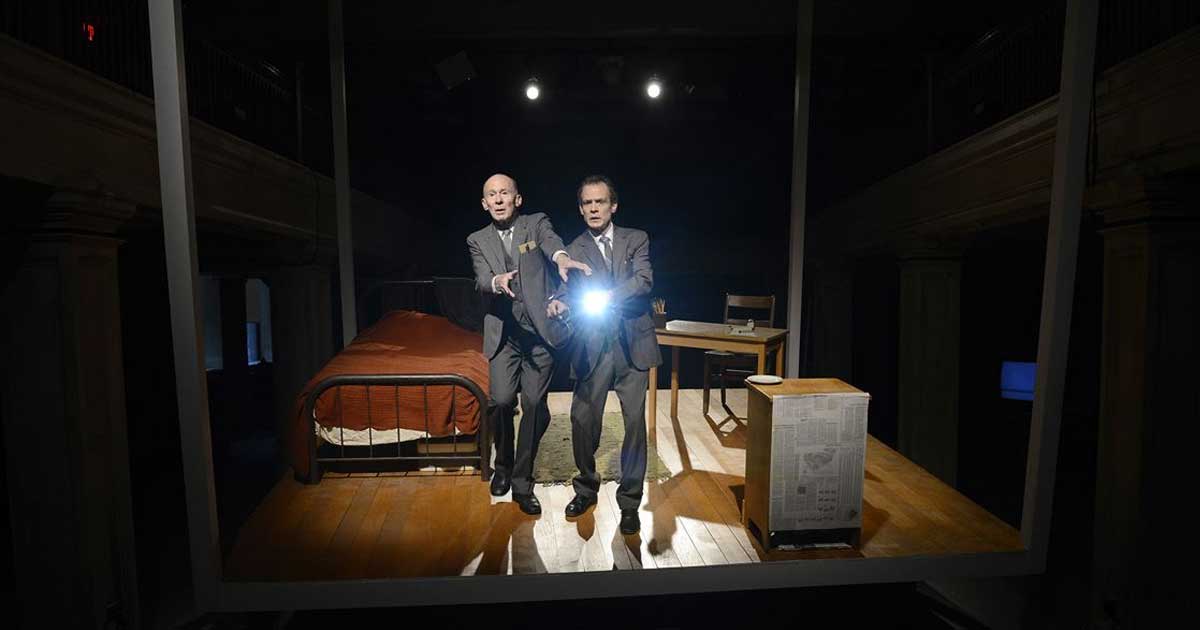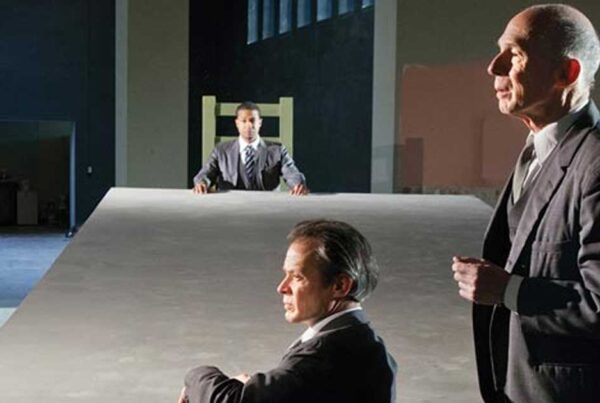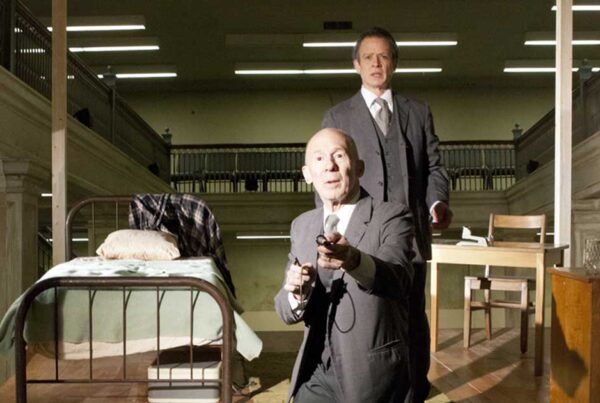
Pittsburgh Post-Gazette – A puzzle pursued in intriguing fits and starts, narration alternating with wordless installations, magic walls that write, a ceiling that speaks, characters doubled, the audience on the move … it must be Quantum!
At “All the Names,” the peripatetic audience parallels the story, absorbed in the dream-puzzle, following the trail from room to room. Like the characters, pursuing the tale through its labyrinth to face their own fears and desires, we attend to the trail of colored thread, assembling the story as we go.
The result is an evening replete with comedy, mystery and, most movingly for me, melancholy. In Quantum’s way, the telling is more mesmerizing than what is told. “All the Names” is ultimately all about the search, whether by audience or central character.
Senhor Jose he is called in this world premiere adaptation of Jose Saramago’s novel of the same name, as translated by Margaret Jull Costa and “devised” by Barbara Luderowski (scenic design), Narelle Sissons (scenic and costume), Chris Evans and Sarah Pickett (sound), Cindy Limauro (lighting), Megan Monaghan Rivas (dramaturgy), Joe Seamans (projections) and Karla Boos (adaptation and direction).
That’s a lot of cooks stirring the pot, but it’s a big pot to stir, using four or more rooms plus staircases and walls and ceilings to pursue the story.
The chief pursuer is Jose, played simultaneously by the modest, bewildered and often woeful James FitzGerald, and his more physical doppelganger, played with unctuous precision by Mark Thompson. Mainly, this alter ego acts for Jose as a physical extension, acting out (or debating) his indecision.
Jose is a clerk in a monstrous, ever-expanding Registry, a Borgesian repository of birth and death, presided over by the distant Registrar (Cameron Knight), who is all the more authoritarian because he speaks with such placid indifference.
As an antidote to his professional absorption among the names, dates and numbers, Jose collects clippings about the famous until, checked in his proliferation of duplicate identity cards, he happens upon a single card that becomes an obsession. His determination to track down its subject, a woman in her 30s, is the central plot of “All the Names.” In retrospect, I think it takes longer than it should to get to this point, but from here on, the play’s double Joses’ and audience’s simultaneous searches are relentless.
In a different doubling, a woman (Bridget Connors) who is key to Jose’s search has a vocal doppelganger who speaks her reactions to Jose’s interrogation, as though these are her unwilling responses or perhaps her thoughts. This double is voiced by the actor who plays the Registrar: The two rub off on each other, the Registrar humanized, the woman’s voice given authority. When that same voice narrates, it adds a dreamlike monomania.
Bits of narration are scattered throughout, and, indeed, “All the Names” is heavy with narration, in the way of novels turned into plays. But that static quality is offset by the scenic wonders, as we wander through Ms. Luderowski’s and Ms. Sissons’ evocative spaces that are art in themselves. So are Mr. Seamans’ surprising and often witty projections. Add Mr. Evans’ and Ms. Pickett’s pervasive soundtrack and Ms. Limauro’s fluid lighting (surprisingly so for such a rabbit warren of spaces), and it’s clear why they are all credited as co-collaborators.
Ms. Boos, Quantum ringleader, directs with imagination. It would be an impossible project without her chutzpah at the helm. Thankfully, there is also a posse of assistants to help the audience go with the flow.
The primary spaces include a room with walls that are covered with chalk (we are given chalk, as if invited to add to the random accretion). Names and pictures appear on the walls. A handsome larger room includes a balcony with railing, from which we look down on the Registrar’s office, a tilted construct with a forced-perspective desk — he high above, the two Joses far below.
A haunting musical motif recalls “The Third Man.” Myth hangs heavy in the air — the Wandering Jew and especially Ariadne and the yarn that led Theseus to safety. You may also think of Jorge Luis Borges’ infinite library and the surreal tremors of Franz Kafka — in this case, Kafka-lite. There’s even one more character, unannounced in the program.
It has Quantum all over it: unconventional place, staging and script, plus bemused audience. Not told from many perspectives, as was Quantum’s “Tamara,” last fall, it invites us to bring our own questioning perspectives into play, as with the haunting memory of a dream, part crystal clear, partly quickly fading to black…




